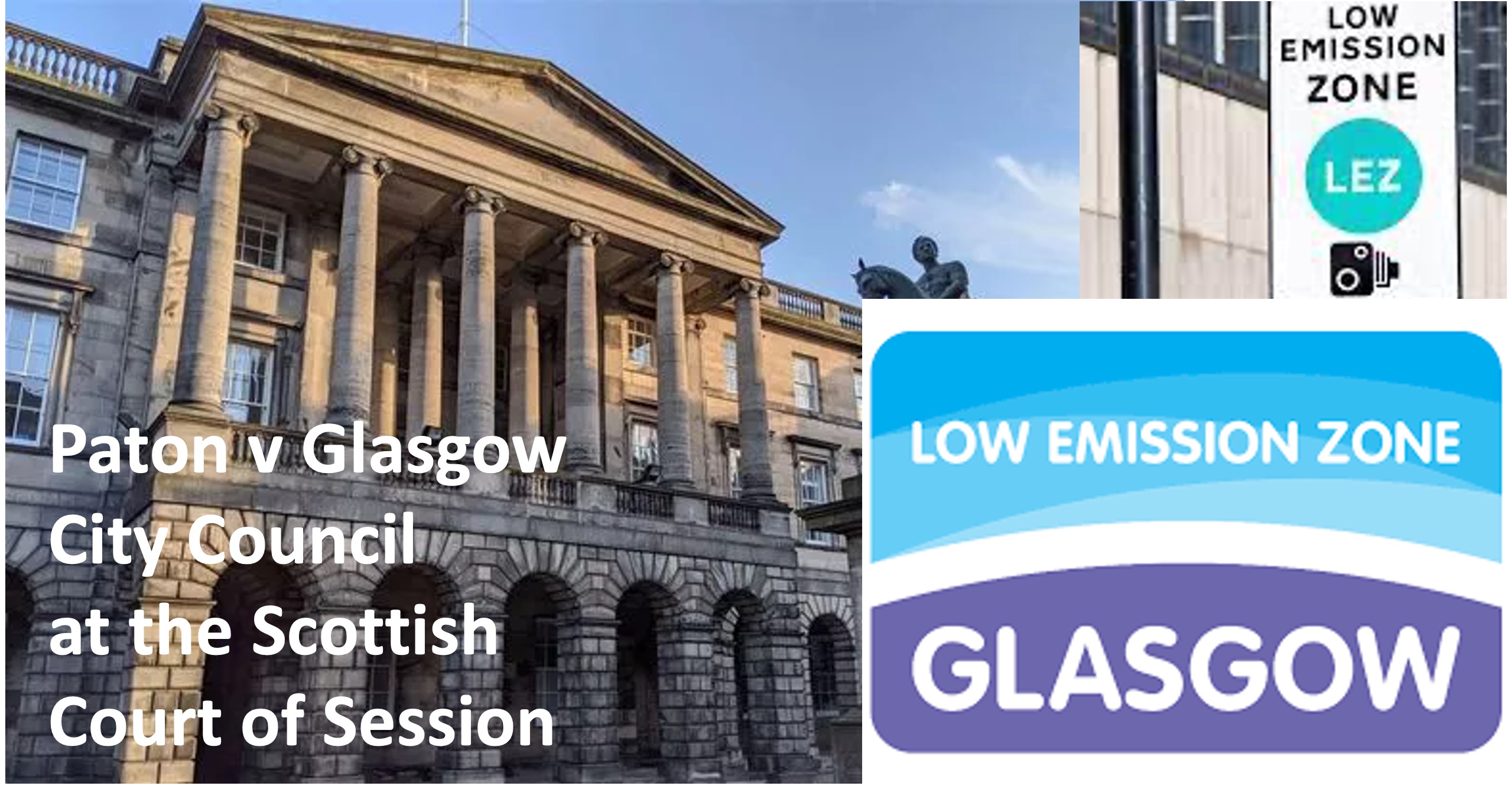This is Blog no 51
Three months after Sadiq Khan successfully defended a judicial review against London’s extended Ultra-Low Emission Zone (ULEZ), Glasgow City Council has secured a similarly successful outcome

When John Paton’s car vehicle repair business challenged the lawfulness of Glasgow’s LEZ scheme, the Court of Session ruled in favour of the Council, and as part of the judgment, addressed important issues of consultation law.
First the wider picture. Cities in the UK have been in breach of European air quality targets for many years, and belatedly, in addition to London, low-emission zones have been adopted in Birmingham, Bristol and Bath – with more to follow. In Scotland, Edinburgh, Aberdeen, and Dundee are expected to follow suit.
They are controversial. Opposition in London is credited with winning the Uxbridge by-election for the Conservatives – and this led to the recent Plan for Drivers. Ministers clearly think they are tapping into a vein of discontent both north as well as south of the border. Mr Paton’s fellow campaigners in Glasgow style themselves the LEZ Fightback – dedicated to opposing the ‘war on motorists’!
Various arguments were heard in Court. The LEZ was not necessary, Paton’s lawyers claimed, as independent researchers had asserted that the requisite standards had already been met. It need not have covered as large an area – it was not therefore, proportionate. Then there is the human rights angle – this was an ‘unjustifiable interference with Paton’s peaceful enjoyment of his possessions.’ Lady Poole, the Judge, found against him on all these grounds.
The consultation issues are, however of some interest.
First is the question of whether the Council had properly taken into account all material considerations. Unlike the schemes in England where drivers of non-compliant vehicles can drive into the zones upon payment of a charge, the Glasgow LEZ imposes progressively steeper fines for those who ignore the ban. Mr Paton could not therefore subsidise the 35% of his customers who drove such vehicles to his repair business and was seriously impacted as a result. Surely such impacts needed to be considered?
But the Court pointed to the consultation that had taken place. The design of the scheme had been consulted upon and attracted 973 responses. This had informed the subsequent statutory consultation which lasted 10 weeks and obtained 2,941 contributions. Many businesses had expressed their views, but Paton had not. He had pursued his cause in other ways. So, were his circumstances so unique that it would be unlawful to have ignored them?
Lady Poole decided that they did not. She cited the 2021 Friends of the Earth challenge to the proposed Heathrow third runway case where Judges categorised different kinds of ‘considerations’ that might be of material significance to a decision. Nothing in the governing legislation, said Lady Poole, suggested that GCC must ‘expressly take into account businesses reliant on vehicles not footfall’
And, in contrast to the famous Kohler v Mayor of London case in 2018, she stated that:
‘It was not necessary for GCC to work through every consideration which might conceivably be
regarded as potentially relevant to the LEZ scheme, and positively discount them.’
(at Paragraph 54)
This may come as some comfort for hard-pressed consultors worried about possibly missing a significant response – and which, if they ignore it, might render the decision unlawful. But this case was different, and Mr Paton had not submitted a convincing consultation response. So, one might advise caution! It IS a parallel situation, but far from an EXACT parallel.
The other complaint about the consultation was that it was clearly pre-determined. Over the years, there have been several successful challenges by those who can show that decision-makers had already made up their minds. But here, there was scant evidence. Instead, the Court was ‘invited to draw inferences of pre-determination from there being only minimal changes to the scheme and GCC continuing with the scheme despite negative views expressed …’ That’s a pretty weak argument, and the Judge had little difficulty in dismissing it. After all, the obligation on a consultor is to conscientiously consider responses – not to agree with them.
The case reinforces established law, though it is good to remind organisations that successfully defending cases like these is a question of showing best practice consultation having been undertaken.
Most significant, however, is the continuing evidence that bringing about behaviour change in the cause of net zero or air quality is not going to be plain sailing. Ministers and Councils need to anticipate the ambient politics and to assume legal challenges if there are any weaknesses in the approach taken to public engagement and consultation.
Rhion H Jones LL.B
Commentaries are prepared primarily to help consultation practitioners take account of developments in the law and to guide them on situations where legal advice should be sought. They are no substitute for reading Court judgments or studying statutory provisions or associated Guidance.
Rhion has monitored and written commentaries on the Law of Consultation since 2007 but does not provide legal advice. He will, however, be happy to discuss the content of this or any other commentary.
See Rhion's Speeches etc - click here
For More like this - free of charge: now click here
Leave a Comment
I hope you enjoyed this post. If you would like to, please leave a comment below.